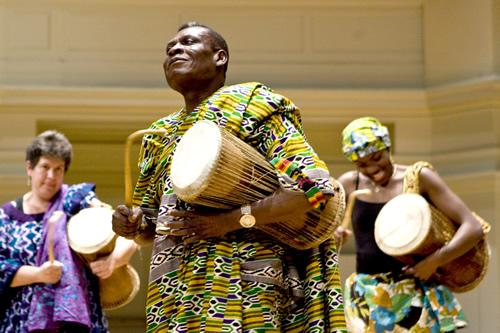The African sound and music is by far the most exciting thought-provoking piece of art. According to music legends and global influencers, the continent is blessed with an abundance of natural resources and talents that create a very unique sound. Like sounds from Asia, India and perhaps the Middle East, African music is highly rhythmic, consisting of complex patterns which often involve one rhythm played against another to create a unique sound. Beyond its rhythmic nature, the African sound becomes extremely distinctive from the western sound as it doesn’t follow any harmonious fashion. It aims to express life in all its entirety, in all aspects through the medium of sound.

For these reasons, the late South African president and apartheid hero, Nelson Mandela said of the African sound as, “The curious beauty of the African music is that it uplifts even as it tells a sad tale. You may be poor, you may have only a ramshackle house, you may have lost your job, but that song gives you hope.” This is exactly what African music represents. It is food to the soul, a reason patrons across the globe infuse elements of the sound in their tune. No matter how you want to put it, the uniqueness of tunes from Africa is distinct.
It is believed that one of the most important influences on 20th-century music was from African-Americans who infused a rhythmic culture to sound despite being in the shackles of segregation. Blues was created during that period. This music genre evolved from the horror, torture and cries of African slaves working whiles chanting. Today, Blues is a genre, well circulated across the globe with an influence on jazz, rock and classical music. The influence of jazz cannot be underestimated as it has transformed the world scene.
Growing up in Lagos Nigeria, I grew up listening to Fela Kuti, King Sunny Ade, Pasuma Wonder, songstress Onyeka Onwenu and the Grammy winner Miriam Makeba. By virtue of being partly Ghanaian through my dad, I had the privilege of listening to a few melodies from Amakye Dede, Kojo Antwi and others. With that experience and memories, I realized that timelessness is a unique quality of good music.

The most notable genre of music from this part of the world is Highlife, Afrobeat, Juju, Agbaja, Zulu, Apala, Fuji, Waka and Yo-pop et al. Most of these genres are made with local instruments including a variety of percussion instruments like xylophones, djembes, drums and tone-producing instruments such as mbira or thumb piano.
One might ask, despite the several achievements from these accomplished legendary musicians and the creativity and originality of their craft, were they valued as they ought to? – an argument for another day.
African sound and music have not always been in an advantaged position to compete with the Western sound. Just about 20 years ago, local unstructured music industries across the continent were in the early stage of the renaissance led by Nigeria after years of neglect during the 80s and 90s. The lack of industry infrastructure, political turmoil, combined with the rampant piracy meant that artistes struggled to be commercial or compete in the world stage.
Despite the retrogressive nature of music in the ’90s, it’s safe to say that the hunger for success in the “new school” as they like to be called was greater than the “old-school”. This has been helped largely by the growth of local economies of countries like Nigeria and Ghana, where there was a new found desire for home-made entertainment.
The 2000s saw a significant improvement in Africa’s unique sound after Nigeria’s 2Face Idibia released his monster hit, “African Queen” What a song! With over 10 million views on YouTube till date, African Queen elevated the commercial value of African music and put it back on the music map. That song had an 81% 5-star review on Amazon and was the theme song for Hollywood movie, Phat Girlz – the movie sold well over 7 million copies at the box office. The success of African Queen was Nigeria’s gateway and by default Africa’s path to the western market.
Immediately afterwards, D’Banj [Nigeria], Don Jazz [Nigeria], Nice [Nigeria], Falli Ipupa [Congo], Desmond Blackmore [Ghana] and Sarkodie [Ghana] have seen a prolific rise to the international stage, via the BET Awards.
All through this era, the African sound took a position that made it distinct and relevant across the globe. It didn’t take long before we witnessed the influx of American A-list musicians, Rick Ross, Akon, Sean Paul and Neyo relishing the opportunity to work with our local talents. You would say it was mere business or they were being accommodated, however, to the African, this was an opportunity to expand the scope of our music and improve the market.

Since then, Tiwa Savage, Stonebwoy have all signed top recording deals with Sony and Universal records respectively; Nigeria’s Davido and Wizkid have sold out the O2 Arena, the latter has performed in India, South Africa and Russia at the opening ceremony of the 2018 World Cup. Ghana’s Wiyaala, Reggie and Bolie performed at Queen Elizabeth’s 92nd birthday celebration. Since 2010, the BET Awards have created an International Category to honour outstanding achievements from Africa.
It is still a long road to achieving the ultimate, either way, we can all conclude that alas, the world in part has accepted the African sound.










